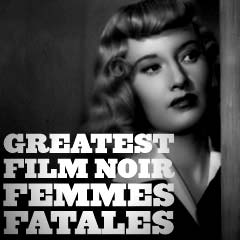
|
Femmes Fatales in Classic Film Noir 1950 - 1952 |
(chronological by film title) Introduction | Picture Guide | 1941 | 1944 | 1945 | 1946-1 | 1946-2 | 1947-1 | 1947-2 1948 | 1949 | 1950-1952 | 1953 | 1954-1956 | 1957-1959 |
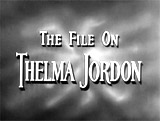
|
The File on Thelma Jordon
(1950) (aka Thelma Jordon)
This melodramatic film noir story (sometimes dated as 1949) was the last noir directed by Robert Siodmak. It centered around a mysterious, duplicitous and treacherous femme fatale - the film's title character - who used a gullible attorney to cover up her crimes of murder and larceny (in a conspiracy with her sinister, estranged husband/boyfriend). It has been frequently compared to André De Toth's Pitfall (1948), and to Billy Wilder's masterpiece Double Indemnity (1944) - the story of a seductress who fell in love with her fellow co-conspirator and then became treacherous. Two taglines described her ferocious nature:
In the story set in the 1940s somewhere in Southern California in late May, Thelma Jordon (Barbara Stanwyck) - unannounced, arrived late one evening in the office of Chief Investigator Miles Scott (Paul Kelly). There, the flirtatious dame found unhappily-married, 35 year-old Assistant District Attorney Cleve Marshall (Wendell Cory) alone and on a binge, feeling trapped by his family ties and responsibilities. He was deliberately a no-show for his anniversary with his wife Pamela (Joan Tetzel) - she was more loyal to her wealthy and over-bearing father (a retired judge), and constantly criticized Cleve, pushing him to heavy drinking after working hours.
She arrived with a simple knock on the door and the words "Excuse me." She entered the open-doored office - to report a crime, noting: "I wish so much of crime didn't take place after dark. It's most unnerving." She soon chose him as the duped fall-guy when she told about the threat of a prowler and attempted burglaries at her wealthy aunt's mansion where she lived. After he helped her to fix a parking ticket on her car parked outside, Thelma captured the emotionally dependent heart of the intelligent and noble Cleve. They ended up at a restaurant where he insisted on dancing with her, even though the establishment was closing: ("This is wonderful. 'S our anniversary. How long has it been? Three hours"). Thelma was compelled to throw him out of her car when he claimed he loved her, but she then became briefly passionate with him by embracing and kissing him:
The next day after the work day was over, Thelma approached Cleve outside his office with the admission: "My crystal ball was right. You are married." She had discussed her report of attempted theft at her home with investigator Miles Scott earlier in the day, and a plainclothesman named Thompson was sent to patrol the house. Cleve briefly apologized for his forward behavior toward Thelma before she drove off. When Cleve returned home, he found Pamela packing - but still vowing her love for him. She was leaving with their two children for their customary summer stay at their beach home (June 1st-Sept 1st). He decided to remain behind (except on some weekends) to allow him to be free to date Thelma. Soon enough, Thelma led Cleve on (she claimed that she was "full of emptiness" since their first meeting), and arranged to go out to dinner with him. During their short conversation, she revealed some of her past to him. As they said goodnight, he revealed that he was entranced by her: "I don't care what happens. I've got to see you often" - and they shared another kiss. When Thelma approached her house in the dark, she was startled when she was intercepted by a shady looking character named Tony Laredo (Richard Rober), who had eavesdropped on their kiss: "I hate to be an eavesdropper." He immediately demanded a kiss as well. Date after date followed between Cleve and Thelma, as she manipulatively engaged in an adulterous and illicit (but genuine) love affair with him. She laid on the romance thick during lovers' lane encounters: "I only know I think of you all day and all night, what I'll wear so you'll look at me with that look in your eyes like now, what I'll say to you: 'I can't see you anymore,' and what I'll do the next time you take me in your arms." Then, she confessed (falsely) to him that she had lovelessly married a nefarious gambler named Tony Laredo whom she met at a roulette table, in order to get into show business as a "glamorous" actress. However, he was unfaithful to her and stayed with her until her money gave out, which was when they separated. She lied when Cleve asked if she had seen him lately. Cleve compelled Thelma to repeat the following vow to him: "I don't think of him anymore because of you." They made plans to get away for the weekend, and Thelma wrote a note to her Aunt Vera Edwards (Gertrude Hoffman) about her trip. That Friday - a stormy night, Thelma's elderly Aunt Vera was awakened by shutters and doors banging and other noises downstairs. She grabbed a .32 revolver and soon after as she entered the library door, a shot (and flash) rang out in the dark. She was murdered in her home - a shocking scene about mid-way through the film. (It was unclear whether Thelma or Tony had committed the murder.) Cleve spoke on the phone to a frantic Thelma ("Something's happened!"), and was summoned to the house and the crime scene where Thelma divulged: "She's dead, shot." Her first inclination was that Tony might have returned and could have been the killer. She explained that ages ago, she had told Tony about Aunt Vera's valuable $200,000 emerald necklace (that was now missing), and didn't want to be implicated. Cleve assured Thelma: "We're not going to let them suspect you." Cleve urged Thelma to go back into the house, scream, and then call the police. But first, he helped her to reconstruct an 'untouched' version of the crime scene (she was instructed to replace any fingerprints that she had rubbed off to make it look like an inside job - prints on the safe, on the room's light switch, and on the body), so that neither of them (or Tony) would be suspected of foul play or tampering with evidence. Thelma found her note to Aunt Vera and hid it. Cleve told Thelma to shut off the lights and to pretend that she was asleep when the police arrived. Afterwards, as the mansion's butler Sidney (Harry Antrim) entered the house from the servant's quarters, Cleve exited through the window where the burglar supposedly came in, and left footprints in the mud. He fled to his summer beach house, where he admitted that he was "playing around" to Pamela, but didn't want a divorce ("I still love you"). During an investigation into the murder, it was determined that Thelma was never married to Tony, and that he had called from Chicago - presumably to create an alibi for himself. Thelma admitted her lie about being married to Tony, and Cleve promised to help ("I'll do anything possible, anything") by hiring experienced attorney Kingsley Willis (Stanley Ridges) from San Francisco to defend Thelma. At that point, Thelma, a prime suspect, was arrested and booked for murder. Cleve also supported manufactured suspicion about an unseen accomplice dubbed "Mr. X" (actually Cleve himself, although it was implied that he was Thelma's estranged boyfriend Tony), who was called to the crime scene and was briefly seen fleeing through a window, but unidentified by the mansion's butler Sidney. A grand jury swiftly indicted Thelma for the murder (her Aunt's recently-rewritten will in her favor was a major factor), and the jewels were recovered. The DA assigned to the case was Cleve's boss Melvin Pierce (Barry Kelley), but he was soon removed and replaced by Cleve himself, who took up the prosecution on her behalf. The misguided and self-deluding, love-struck Cleve threw aside his family, future, and honor to secretly help defend Thelma, even though he was charged with prosecuting her, and knew that she was the cold-blooded, calculating murderess. (To Cleve's shock, it was also revealed by Pamela that her father had hired a detective to follow Cleve - and had uncovered his affair with another woman - the woman he was prosecuting in the trial.)
During the trial as Cleve attempted to manipulate the case in Thelma's favor, evidence was revealed that Thelma had led a dark life of blackmail, minor thefts, and gambling during her relationship with her partner-in-crime Tony in Florida. As a bleached blonde (seen in a photo) with a checkered past, she had been arrested in a gambling raid. Cleve was able to circumvent the revealed, damaging evidence of Thelma's earlier indiscretions. Due to "reasonable doubt," circumstantial evidence, and the possibility that "Mr. X" might have committed the crime, she was found not guilty. After the trial, Thelma inherited her Aunt's house and was extremely wealthy. Cleve came to the house during a post-trial rendezvous between Thelma and Tony, who were packing to leave (and had planned the robbery-murder a long time ago). She admitted that Tony had reappeared from Chicago for her, and that she was planning to flee with Tony and live off her Aunt's inheritance ("He's come after me. I'm going away with him"). During a final confrontation, her lies and guilt eventually caught up with her. Cleve was humiliated when told that she loved Tony instead of him: ("He's part of it - he's all of it. I've always loved him...You must have known, except you didn't want to know"). She also confessed that she had killed her Aunt Vera, and that Cleve had been set up to help defend her: ("I killed her... I'd like to say I didn't intend to kill her, but when you have a gun, you always intend if you have to. You were the fall guy, Cleve, right from the beginning"). After Tony knocked out Cleve from behind with two blows from his gun, Tony and Thelma fled together to go away. She struggled with accomplice Tony as he drove on a winding mountain road, trying to injure him by bashing him in the head with a burning-hot dashboard cigarette lighter. He died when their car crashed through a barrier over a cliff and burst into flames, while Thelma was hospitalized with lethal injuries when thrown from the wreckage.
During her deathbed scene in Mercy Hospital, she made a full confession to chief investigator Miles Scott, except the identification of her accomplice "Mr. X." When Cleve arrived and asked why she had withheld Mr. X's identity, she explained her remorse and that she really loved Cleve:
She died after her redemptive act. The suspicious Miles realized that Cleve was the mysterious "Mr. X" who had deliberately thrown the case as her prosecutor, because he believed in her. Cleve confirmed there was more to it: "I loved her." In the film's epilogue, Cleve resigned after confessing his complicity to the DA. His law practice career was in shambles and his marriage was broken ("I'll get in touch with her later") - he said farewell to Miles and walked off alone into the shadows, basically having lost everything. |
|
|||||||||||||||||||||
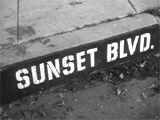
|
Sunset
Boulevard (1950) (aka Sunset Blvd.)
Director Billy Wilder's classic black comedy and noirish drama about a doomed romance with a femme fatale in Tinseltown was a gothic masterpiece about "behind the scenes" Hollywood, self-deceit, spiritual and spatial emptiness, and the price of fame, greed, narcissism, and ambition. It opened with a shocking twist beginning - a view of the posthumous, disembodied narrator - cynical, down-on-his-luck B-movie hack screenwriter Joe Gillis (William Holden), who was sent to his doom and spoke beyond the grave (in voice-over) as a dead man corpse floating face-down in a swimming pool in a rotting Beverly Hills mansion. His voice-over narration was delivered cynically and crisply in a film-noirish style, by the disembodied dead man. At about 5 am in the morning, motorcycle officers, followed by police cars with sirens blaring, carrying a homicide squad, detectives and reporters, rushed down Sunset Boulevard to a mansion in Beverly Hills in the 10,000 block. There, they found a dead body floating face down in a swimming pool:
He recounted in flashback (with cynicism) about a six-month period during which he struggled to produce screenplays that would sell, to meet the demands of the industry. Joe was introduced as a struggling, indebted, down-and-out, depressed $35/week newspaper copy desk writer from the Midwest (Dayton, Ohio), who was working as a screenwriter in his one-room Alto Nido apartment house in Hollywood.
He had failed to have his most recent screenplay for a baseball/gambling picture (Bases Loaded) approved by Paramount Pictures' producer Sheldrake (Fred Clark) after young and pretty script reader Betty Schaefer (Nancy Olson) offered a harsh criticism of his script as formulaic: ("I wouldn't bother...It's just a rehash of something that wasn't very good to begin with....I just didn't think it was any good. I found it flat and trite"). While fleeing in his car from repo men who wanted to take back his 1946 Plymouth, Joe happened to have a flat tire and was able to pull into the driveway of a decaying, seemingly-deserted, neglected "white elephant" mansion in the 10,000 block of Sunset Boulevard. He hid his car in the empty garage of the 1920s home, and then heard a woman wearing dark glasses behind a slatted shade beckoning him from the house: "You there! Why are you so late? Why have you kept me waiting so long?" (He was mistaken for the undertaker who was about to arrive with a coffin for her recently-deceased pet chimpanzee.)
After being summoned inside by an unidentified butler, he ventured upstairs where in the corridor, he met the home's owner - she was dressed in black house pajamas, wearing sunglasses and she had a leopard-patterned scarf wrapped like a turban around her head. She brought him into her bedroom to view her dead chimpanzee. During their initial conversation, he recognized her, and commented about how big she was in silent pictures: "You're Norma Desmond. You used to be in silent pictures. You used to be big." In one of the filmdom's most quoted lines, she bristled back indignantly about the rise of the talkies and the end of the silent era:
She was the wealthy, aging, reclusive Norma Desmond (Gloria Swanson), Paramount's greatest film star during the silent era ("an old time star...one of the biggest"), but now a relic forgotten for the past twenty years. She boasted about a script she was writing about the Biblical figure Salomé for her screen comeback, hopefully with director Cecil B. DeMille. She watched him intensely as he read her hand-scrawled script for her triumphant re-entry ("return") into film-making ("she sat coiled up like a watch spring - her cigarette clamped in a curious holder"). He bluntly realized that her script - that desperately needed editing - was a "silly hodgepodge of melodramatic plots" that required more dialogue, and "certainly could use a pair of shears and a blue pencil." She hired him on the spot to finish her script, for $500/week, and insisted that he live on the premises. Joe was able to satisfy the thirsty illusions of immortality of the aging, waspish, megalomaniacal fading, ex-silent film star queen Norma Desmond. For the first night, he stayed in the room over the garage, and upon awakening found that his 3 months' overdue rent had been paid and all of his possessions had been brought to the room by her faithful butler/ex-husband Max (director Erich von Stroheim). Joe felt irretrievably trapped, but realized he needed the money and editing job, so he acquiesed to stay for a few more weeks. She was overly observant of him: ("She was around all the time, hovering over me, afraid I'd do injury to that precious brainchild of hers"). There were numerous short scenes interwoven, including the moonlight funeral/burial and last rites for Norma's pet monkey in a baby coffin in her backyard, and the scenes of Norma watching screenings of her old silent movies projected in her living room (including Swanson's own disastrous and uncompleted Queen Kelly from 1928), when she proclaimed: "We didn't need dialogue. We had faces. There just aren't any faces like that anymore. Maybe one, Garbo. Oh, those idiot producers. Those imbeciles. Haven't they got any eyes? Have they forgotten what a star looks like? I'll show them. I'll be up there again, so help me!" Some days, there was a bridge game in the living room with her old "waxworks" actor-friends from the silent era. Max would chauffeur Norma and Joe around town in her fancy, open-air handmade 1929 Isotta-Fraschini car. She made him her "kept man" by taking him to an exclusive mens' shop to acquire fashionable clothing, including a tuxedo. On one occasion, the pushy clerk insisted that Joe select the more expensive vicuna rather than camel's hair since Norma was paying the bill: "Well, as long as the lady's paying for it, why not take the vicuna?" During California's rainy season, Joe was moved into her decaying Sunset Boulevard mansion - into the bedroom of one of her ex-husbands. Max admitted to Joe that he had kept up Norma's fanciful delusions about her stardom by sending her fan mail letters that he had written. During an aborted New Years' Eve party that she had hosted for only Joe and herself, he abruptly left to escape her smothering and controlling nature after telling her: "Has it ever occurred to you that I may have a life of my own?...What I'm trying to say is that I'm all wrong for you." He departed after she slapped him across the face. Later that evening after she attempted to commit suicide by cutting her wrists with a razor, Joe felt obligated to return to her after he phoned and learned of her suicide attempt. Once back in the mansion, he thanked her: "You've been good to me. You're the only person in this stinking town that has been good to me." Although further entrapped, Joe decided to remain with her as her bought lover. At the mansion one day when she sensed that Joe was bored, Norma transformed herself into a Mack Sennett Bathing Beauty and then into Charlie Chaplin as The Tramp (with black mustache, derby hat, and cane), part of her playful "live show" entertainment for him. Norma finally engaged in a much-anticipated meeting with director Cecil B. DeMille on the set of Samson and Delilah (1949), after deciding to be chauffeured to the set in her large touring car - without an appointment. She was deluded into believing that De Mille would naturally produce her triumphant comeback movie. Upon her arrival, De Mille, on sound stage 18 in jodhpurs and boots, was informed through a succession of assistants, that Norma (who "must be a million years old") was on her way. The great director reacted with some sympathy for her as a destroyed victim of Hollywood's sound revolution, knowing that her youthful stardom was ruined by press agents "working overtime" as she aged. Pioneering Hollywood director De Mille greeted her at the sound stage door when she arrived in the limousine: "Well, hello, young fellow...It's good to see you." For a moment, Norma basked in the light of a spotlight and returned in her mnd to her days as a silver-screen beauty, although the studio had really only contacted her to inquire about renting her luxury vintage 1929 Isotta Fraschini car for a Crosby picture. However, Norma was completely deluded about working again with DeMille: "We'll work again, won't we, Chief? We'll make our greatest picture....I just want to work again. You don't know what it means to know that you want me." Although she was exhilarated, DeMille had no intention of filming Norma's script with her starring role. As Joe stated in voice-over, the vain Norma prepared vigorously to be in a starring role: "She was absolutely determined to be ready, ready for those cameras that would never turn." While ensnared by the demented Norma, opportunistic Joe began to have genuine feelings for 22 year-old clean-cut, Paramount script reader Betty Schaefer, when he would sneak off and work with her on their own script during late-hours in her studio office. He told her that she was extremely tempting to get involved with - as a "smart girl. Nothing like being twenty-two. And may I suggest that if we're ever to finish this story, you stay at least two feet away from me. Now the first time you see me coming any closer, I want you to take off a shoe and clunk me on the head with it." After being showered with bribes (clothes, money, flattery and other gifts), Joe had become quickly spoiled and ensnared in Norma's web of delusion - and death trap. His budding relationship (and long hours away from her) was threatening to Norma, who inevitably became jealous and delusional and accused him of being unfaithful with another woman, especially after she found his manuscript for a co-scripted 'UNTITLED LOVE STORY" written with Betty Schaefer. Joe's extra-curricular associations also would become a concern for Betty's fiancee Artie Green (Jack Webb) - especially when Betty confessed that she was no longer in love with her fiancee. (Betty: "Of course I love him. I always will. I'm not in love with him any more, that's all." Joe: "What happened?" Betty: "You did.") Joe spontaneously took her in his arms and they kissed, obviously in love. To reveal Joe's hidden life and disrupt his relationship with Betty, Norma phoned to inform her and ask: "Do you know where he lives? Do you know how he lives? Do you know what he lives on?" Her intention, under the guise of helping her, was to show how Joe had been deceiving her: "I'm trying to do you a favor. I'm trying to spare you a great deal of misery." Joe intercepted the call and invited Betty to see where he lived, in person. Joe learned that Norma, tormented by his relationship, had bought a revolver and contemplated killing herself. During a climactic visit by Betty to the mansion, Joe admitted he was a dependent gigolo and 'kept man' under contract who lived off Norma's wealth. Betty was willing to forgive him and leave with him, but Joe stressed his predicament: "I've got a good deal here. A long-term contract with no options. I like it that way. Maybe it's not very admirable." He sadly terminated their relationship by showing her the exit, and encouraging her marriage to Artie. In front of Norma, Joe began to pack up and return to Dayton, Ohio (for his copy desk job) and she became distraught and cried out madly: ("I can't face life without you. And you know I'm not afraid to die"). He also burst Norma's delusions about her comeback: "The audience left 20 years ago - now face it!" - and he told her the truth about her fan mail and studio visit. Threatening suicide and shouting out: "No one ever leaves a star," the temporarily insane Norma turned her gun on him and shot him twice in the back and once in the stomach as he walked away toward the outdoor pool. He tumbled backwards and capsized into the water, face-down. After shooting Joe as a "crime of passion", the police and camera news-crews arrived ("the heartless so-and-sos") by daybreak. Once the crazed and deluded woman heard that there were "Cameras!", she was persuaded and coaxed to quietly come downstairs to a waiting car through a group of assembled reporters and cameramen - to surrender. Thoroughly deranged, she was fooled and made to think that she was on the set and experiencing her longed-for return - shooting a Salome film scene for famous movie director Cecil B. De Mille. She thought that she was playing the part of princess Salome for the silent film cameras, descending the staircase of the palace.
She paused before she made her last great "entrance" and comeback scene. She regally made a grand descent of her staircase inside her mansion - madly deluded and disoriented, she spoke the film's final words, as police, cameramen and press corps reporters waited to take her away:
At film's end, there was a slow out-of-focus fade out to black on Norma's face as she approached the camera. |
|
|||||||||||||||||||||

|
Ace
in the Hole (1951) (aka The Big Carnival)
Director/co-writer Billy Wilder's powerful noir was an uncompromising, scathing and harsh commentary on human nature, and on the sensationalizing media comprised of self-serving, compromised tabloid-media journalists. After its first release, Paramount Studios was so concerned about the misanthropic film's unrelenting cynicism, anti-Americanism, and poor box-office that they unsuccessfully changed its name and rebranded it as "The Big Carnival." It starred the powerful character of Charles 'Chuck' Tatum (Kirk Douglas) - a belligerent, self-obsessed, unscrupulous big-city newspaper reporter working for the Albuquerque Sun-Bulletin (with its hand-embroidered motto "Tell the Truth"). He had become stranded and was stagnating after being a reckless and down-and-out East Coast news-reporter who was forced to move West when he was dismissed for alleged libel, for cheating with the boss' wife, and for drunkenness. He was looking for a way to make money, get a big break, and boost his sour and drunken reputation after many failures. He gave a contemptuous rant about how he missed New York after being stuck in New Mexico for a year: ("...Too much outdoors. Give me those eight spindly trees in front of Rockefeller Center any day. That's enough outdoors for me...). The quick-thinking, smooth-tongued newsman was on an assignment to report on a rattlesnake hunt, and came upon remote Minosa's Trading Post where they learned about a man caught inside an ancient, haunted Indian ancient cliff-dwelling (Mountain of the Seven Vultures) by a cave-in of rocks 250 feet inside, while looting it of artifacts in the remote town of Escudero, 3 hours' drive from Albuquerque. The cave-in had trapped good-hearted spelunker Leo Minosa (Richard Benedict), the adult son of a trading post owner.
At the site of the cave-in, Tatum met Leo's long-suffering, jaded, cynical and unhappy femme fatale wife Lorraine (Jan Sterling), who was complaining about her husband's foolishness. It appeared that Lorraine was a disgruntled, unhappy, jaded and long-suffering wife, made tougher and more crude by her arid surroundings that she intensely disliked:
Tatum decided to venture into the cave when no one else dared, although Lorraine was scornful and cynical as she lit a cigarette and sarcastically fumed: "And tell him we'll have a big coming-out party for him with a brass band and everything." As Tatum twisted along in the labyrinthine cave, he was already formulating in his mind his plan to get the scoop on this disaster - his own personal ticket for getting out of the entrapping Albuquerque. Tatum sensed a major opportunity to stage-manage an "ace in the hole" media-frenzied story (ripe with drama, sensationalism, disaster and personal gain) involving an orchestrated rescue operation. Leo was pinned at the waist under some very large, and heavy rocks, and was worried about the very unstable confines of the burial cave. Tatum realized that this might be end up being the perfect story to exploit. His objective was not really the man's extrication, but to prolong the perilous situation as long as possible, while befriending Leo and keeping him assured of his trusting nature. Tatum took two photos of the trapped victim - so that he could print the story in the Albuquerque Sun-Bulletin paper - a feature article that he had already begun to create in his mind. It was really only a minor news-story about a cave-explorer who became trapped, but the amoral and depraved reporter milked it into a juicy, big-scoop, blockbuster front-page event by promoting the situation with national media publicity that brought a feeding frenzy of curious tourists to descend upon the site and gawk at the tragedy, while capitalizing on the public's interest and delaying the rescue efforts. The unethical Tatum succeeded in manipulating the news media, the construction engineers, the local crooked sheriff who sought reelection in the county, and the victim's opportunistic, jaded and mercenary wife. From the start, Tatum had to deal with Leo's wife Lorraine. The hard-hearted, bleach-blonde Lorraine watched Tatum as she smiled and calmly munched on an apple - a Biblical reference to Eve (a corrupted temptress). She was already aware of Tatum's underhanded nature - knowing that she was the crucial linchpin that could either hold together or unravel Tatum's manipulative plan. The self-interested and jaded femme fatale Lorraine also undoubtedly saw Leo’s entrapment as a convenient way to exit from her unhappy marriage.
They both hustled the situation - the heartless, opportunistic Lorraine was seriously considering running off from her good-hearted husband after five years of unfulfilled marriage. She had packed her suitcase and was poised to leave. She seemed completely unaffected by the entrapment her husband was experiencing. She realized that Tatum was capitalizing on her husband's predicament:
She also sensed Tatum's true motives - that he was a scheming, hypocritical hustler who was creating a "trapped man" story for his newspaper - to stir up excitement and readership and to jump-start his career:
Lorraine strode over to the Trailways Bus Depot sign for pick-up - ready to desert her husband. Tatum made it his goal to convince her to stay - by pointing out how she would benefit. He promised the bleached-blonde that there would be a financial windfall and monetary rewards for remaining and pretending to be a grieving and virtuous wife:
She was easily persuaded by the promise of revenue from gathering throngs to remain with her ailing husband - the Trailways bus she was supposed to depart on pulled away to reveal Lorraine had changed her mind and was walking back inside. Tatum also sided with local corrupt Sheriff Gus Kretzer (Ray Teal) up for re-election: "What did ya have? A pair of deuces. This is better. Here we've got an ace in the hole." There were frenzied scenes at the rescue site - looking like a drive-in theatre with tourists, a literal circus (S & M) amusement park and carnival, a camp ground, rising admission prices, etc. And all the while, Tatum's main goal was to deliberately delay rescue efforts. Lorraine was fast becoming rich, and she gratefully admitted how thankful she was to Tatum. She complimented him on his cold-hearted pecuniary greed that she was benefiting from:
He was forced to reprimand her for deviating from her feigned sorrow as the worried wife with an ever-widening smile - he slapped her face twice to literally wipe away her pleased satisfaction, to cool her sexual desire for him, and to batter her into submission (just as Leo had unintentionally trapped her). When tears formed in her eyes, he approved: "That's more like it. And don't wipe those tears. That's the way you're supposed to look. Put on your wedding ring. Go on back and peddle your hamburgers." Tatum encouraged her to continue her fake charade of grieving for her husband, and to be available for a photo-op of her grieving at the church. But she cautioned him about ever physically striking her again: "And another thing, mister. Don't ever slap me again." As an accomplice in Leo's prolonged predicament, Lorraine became his own monomaniacal self's mirror-image - reflecting his own cold callousness, selfishness, shamelessness and venality by always angling for the best set-up for herself. When she seemed to be maneuvering to join him back in New York after the crisis was over, Tatum's fist grabbed the back of Lorraine's bleached hair as he drew her close to him ("Why don't you wash that platinum outta your hair?") - their only kiss in the film - obscured by a close-up of the back of Lorraine's head. On the 5th wedding anniversary of Leo's marriage to Lorraine, Tatum retrieved Leo's present for her (a cheap mink stole) and gave it to her, but she snidely rejected it: "I got enough money to buy me a real fur, a silver fox...I hate it, Chuck...It's like him touching me," but Tatum picked up the wrap, slung it around her neck, and insisted that she wear it as he pulled it tighter and began to strangle her: "He wants you to wear it...Don't take it off!" She struggled to free herself, and then suddenly in self-defense, in the film's most shocking moment, she stabbed him in the lower right side of his gut with the pair of scissors in her hand. At the same moment, the site of the accident was engulfed with profiteers as the cursed victim died of pneumonia in the darkness of the cave. Last rites were administered by a priest to pneumonia-stricken Leo after 6 days of being unnecessarily trapped in the cave-in. The severely-wounded Tatum delivered a speech to the crowds to go home after Leo's death:
After hearing the news, Lorraine (without the wrap) turned away from her window and soon emerged from the trading post's second floor apartment with her suitcase - dressed for travel and finally free. However, she remained an outcast and undesirable - she was unable to hail a departing bus and was last seen walking away from the camera amidst the stream of departing cars that were beginning to clog the highway. She vainly sought a hitchhiking ride to escape. Leo's forlorn Papa Minosa (John Berkes) looked at the "Rescue Fund" sign after everyone's departure - with litter blowing in the wind. In the conclusion, after Tatum's hypocritical rescue efforts were uncovered, he received his come-uppance when he expressed some guilt and remorse over his unscrupulous actions - and dropped dead back where he started.
There was a final low-angled shot of bleeding, defeated journalist Tatum collapsing at the feet of his editor-in-chief Mr. Jacob Q. Boot (Porter Hall) and delivering his final words:
|
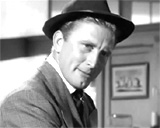 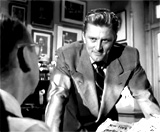 Charles "Chuck" Tatum (Kirk Douglas) - Angling For Job at NM Newspaper  Tatum's Rant About Missing New York 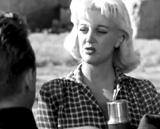 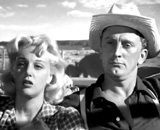 Lorraine Minosa (Jan Sterling), Leo's Wife - Who Called Her Husband a "Dumb Cluck"  Lorraine to Tatum: "I'm on to you. You're working for a newspaper" 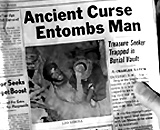 Front-Page News-Story: Cave-In 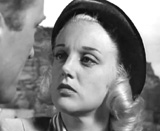 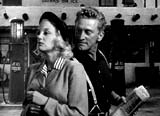 Tatum Convincing Trapped Wife To Stay In Order to Benefit Financially ("There's gonna be real dough in that cash register by tonight") 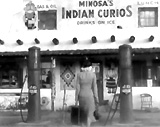 Lorraine Deciding Not to Take the Trailways Bus 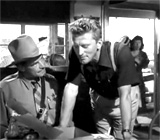 Tatum with Corrupt Sheriff 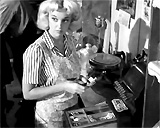 Business Booming at the Trading Post for Lorraine   Throngs of People at The Rescue Site 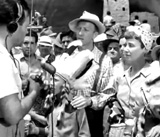 Spectators Being Interviewed 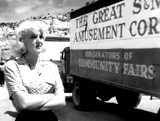 Amusement Trucks Arriving  Arrival of "Leo Minosa Special" Train 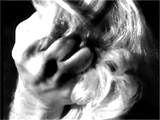 "Why don't you wash that platinum outta your hair?" - Fist Grab of Her Hair For a Kiss 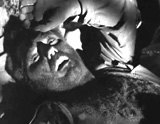 Dying Leo's Last Moments in Cave-In 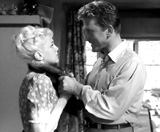 Lorraine with Leo's Mink Stole Gift Around Her Neck 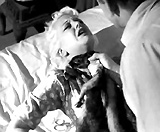 Tatum Strangling Lorraine  Tatum's Reaction to Being Stabbed 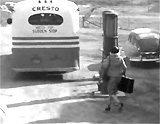 Lorraine with Suitcase Abandoning the Trading Post 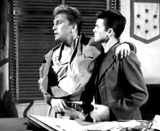 Wounded Tatum Helped Into the Newspaper Office |
|||||||||||||||||||||
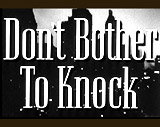
|
Don't Bother to Knock (1952)
Roy Ward Baker's film noirish thriller (his first American film) was sex-pot Marilyn Monroe's 12th credited film but was her first dramatic starring role. In fact, three of Monroe's early roles were in dark and demanding dramas, including two others: Clash By Night (1952) and Niagara (1953) (see later). It was released shortly after the news of her scandalous nude appearance in a calendar photo-shoot. In this film, she starred as a shapely blonde named Nell Forbes, who was revealed to be a very disturbed baby-sitter in a hotel room. A tagline for the film described her:
The film opened in NYC's ritzy McKinley Hotel, where the hotel's lounge-singer Lyn Lesley (Anne Bancroft in her debut film) in the Round-Up Room wondered if her ex-boyfriend, Skyways Airlines pilot Jed Towers (Richard Widmark), would show up to speak with her, since she had recently ended their six-month relationship with a letter ("I invited him not to see me anymore"). She had written him: "This is the end of the line for us." Jed had already registered at the hotel and was in his room. The tough and cynical, newly-single male was smoking and contemplating whether to go to the bar and speak to Lyn, when he heard her crooning voice in the bar piped into his room through a wall radio-speaker. Shy and young Nell Forbes (Marilyn Monroe) entered the hotel's outer revolving doors and stood outside the bar area. She met up with her uncle, the hotel's amiable elevator operator Eddie Forbes (Elisha Cook Jr.), who had suggested her for a baby-sitting job for one of the guests' young daughters for the evening: "You won't have any trouble with her, will you, Nell?" She had been in NY for only a few weeks. The slightly pushy Eddie introduced Nell to hotel guests, newspaper editorial writer Peter Jones (Jim Backus) and his wife Ruth (Lurene Tuttle) - the parents of an 8 year-old girl named Bunny (Donna Corcoran). The inexperienced Nell was hired to be a babysitter for one night for their daughter in their hotel room #809, while the parents attended an awards ceremony event in the hotel's banquet ballroom. Before putting Bunny to bed, Nell read her a fairy-tale story, using a monotone voice. Meanwhile, Jed came down to the bar area to speak to Lyn, where she dumped him after a six-month relationship by telling him outright: "I wouldn't want to marry you....It's something to do with the way you are." She saw no future with him in mostly weekend get-togethers up until then, and was turned off by his coldness. She calmly and starkly criticized his faults: "The way you treat people. The way you think about them. All you can focus on is the cold outside of things. The simple facts. Not any causes or whys or wherefores. Oh, you're sweet and you're fun. And you're hard. And you lack something that I ask for in a man...An understanding heart." He retreated from his former lover to his hotel room #821 - to further sulk and pace the floor. Left alone in the parents' room on the 8th floor, Nell sampled Ruth's 'Liaison' perfume, and wore her bracelet and earrings. She also tried on Ruth's lacy negligee and fuzzy slippers. More disturbingly, she also flirted with the voyeuristic hotel guest Jed Towers in his room, who saw her from a hotel room window across the courtyard, as she closed and then opened her venetian window blinds to signal him. On the rebound and thinking she was available and willing, he telephoned and asked: "Are you doing anything you couldn't be doing better with somebody else?" Calling himself a "lonely soul," he suggested bringing over a bottle of rye: "I'll come over, and we'll spin a few stories. How about it?"
Soon enough, the flirtatious, voluptuous blonde invited the hotel guest over. She applied lipstick just before he arrived, revealing suicidal razor scars on both wrists, and also readjusted her stockings. Bringing over his bottle of rye, he met up with her at her door: "Be neighborly. Ask me in." During their conversation, the emotionally-unstable Nell lied about how she was another hotel guest with her sister (and her out-of-town husband). The initials on the luggage and the presence of a pair of men's shoes were clues to her deception. When he told her he was an airline pilot, she mistakenly believed he was her ex-boyfriend/fiancee Philip - a military aviator who died while flying an airplane to Hawaii in 1946: ("You crashed in the water...in the ocean in '46 on the way to Hawaii. But you weren't killed, you were only lost!...You were rescued! You came back!"). She kissed Jed, thankful that he had returned to her. Their conversations disturbed and woke up the child, who intruded upon their intimacy.
The disruptions led to confusion, and unbalanced and threatening behavior exhibited by Nell towards the young child. Nell ordered Bunny back to her bedroom, but she refused. Bunny even accused Nell and the strange man of stealing her parents' things: "You're a gang. That's what you are. You came to steal my Mother's things...You take off my mother's dress!...You can't make me do anything!" Jed began to realize Nell's flakiness and pathological lying: "You know, you’re a gal with a lot of variations." He also witnessed that Nell was threatening toward Bunny (who was interfering with their evening), and was about to push her out the window ("You won't cry any more, will you?"). The startling incident was also witnessed by nosy, puritanical Emma Ballew (Verna Felton), a long-term hotel resident. As Nell put Bunny to bed, she warned the young girl: "It's wicked to come between people." She also threatened harm to Bunny's favorite doll at home named Josephine if she caused any more trouble: ("Don't utter one sound. And we'll all live happily ever after, you and Josephine and me"). During her private time with Jed (that included kissing, drinking, and flirting), Nell neglected her responsibility for Bunny, and insisted on being with Jed ("Let's dance. Take me down to that bar") when he proposed leaving. She boldly told him:
Nell's dangerous sexuality and psychotic delusional state showed her to be suicidal when he noticed the razor scars on her wrists. She explained the circumstances: ("I did it with a razor...when Philip was given up for lost....I was in another hotel room once. The night before he flew out over the ocean the last time. He said we'd be married when he came back"). When Eddie arrived to check up on Nell, he noted that she had been drinking: ("You smell like a cooch dancer"), that she was restless ("You're ticking like a clock"), and that she had recurring mental issues ("I thought you were getting better...I should have known better, you're NOT cured!"). [Note: Nell had just been released a month earlier after three years as a patient at an Oregon mental institution following her suicide attempt.] He ordered her to remove all items of clothing and jewelry (and her lipstick), but then suspected that she was hiding someone in the bathroom (Jed). As he went to investigate, Eddie was hit over the head by Nell with a large metal ashtray. Jed helped to treat Eddie's serious head injury. As Jed was proposing to leave to patch things up with his former girlfriend Lyn ("tonight I've got a problem of my own to settle"), Nell again thought that he was Philip who was deserting her: ("Maybe you won't ever come back...What would become of me?"). At the same time, Emma and her husband came to the room, as Eddie hid in the closet when they entered, and Jed snuck into Bunny's bedroom, where he saw that she had been bound and gagged by Nell. The meddling couple suspected that Jed (who they had seen leaving the room by a 2nd adjoining bedroom door #807) had been responsible for various disruptions - so they alerted the hotel detective. In the bar with Lyn, Jed briefly shared his experiences with the unbalanced babysitter in the hotel room: ("She was kind of pathetic. Real steady one minute, and all mixed up the next"). She was impressed by his new caring attitude ("I never heard you talk like that before"). Meanwhile, Nell was threatening the young girl and blaming her for sending her lover Jed away: ("If only you'd given me a little longer. He was in love with me. We would've been married. You didn't want me to have him from the beginning. You wouldn't let me wear the pretty things, even when I told you about the doll...You sent those people around, you devil!"). Sensing that Bunny was in trouble while in the middle of his story with Lyn, Jed rushed back to the room, where Bunny's mother had also just entered - and screamed! Both of them were able to fight off Nell and rescue Bunny. Jed released Eddie from the locked closet, where he explained Nell's history of mental problems:
By the film's conclusion, the painfully-damaged Nell snuck away from the room and retreated to the hotel lobby where she cracked up, brandished a razor blade (stolen from a news-desk convenience counter), and threatened to slit her wrists. A reassuring Jed came up to her and she responded: "I didn't think you were ever coming back...I don't want to harm anybody." He was able to have her relinquish the razor and he talked her out of her delusions about him, by convincing her that he wasn't her lost boyfriend Philip. He pointed to Lyn, his real girlfriend: "This is my girl. I'm in love with her." Nell was led away to a hospital for help, as Lyn observed Jed's new attitude of caring: "Jed, you care what happens to that girl, don't you?" Jed replied: "She didn't want to hurt the kid. She didn't want to hurt anybody." His new attitude set up their own reconciliation, as they left arm in arm to return to the bar for a drink together. |
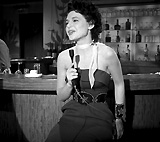 Lyn - Hotel Bar Singer 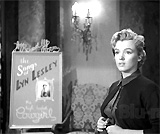 Nell (Marilyn Monroe) Entering Hotel Lobby 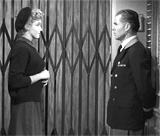 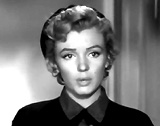 Nell with Her Uncle: Elevator Operator Eddie (Elisha Cook, Jr.) 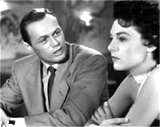 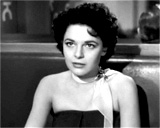 Break-Up in Bar: Jed with Lyn 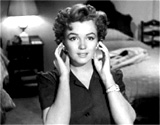 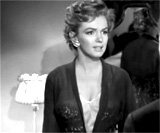 While Babysitting, Nell Tried On Hotel Guest's Jewelry - and More  Suicidal Wrist Scars 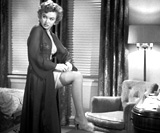 Adjusting Her Stockings 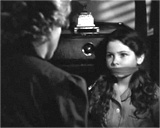 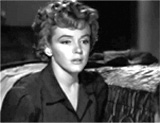 Nell Threatening the Bound and Gagged Bunny 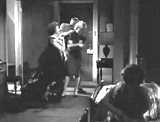 Fighting Off Nell in the Bedroom 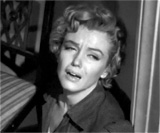 Nell Distraught 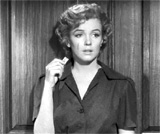 Suicidal Nell Brandishing a Razor Blade in Hotel Lobby 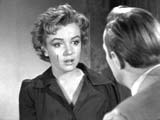 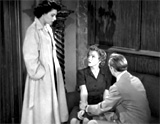 Jed Talking Nell Out of Suicide - with Lyn 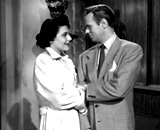 Lyn and Jed Reconciled |
|||||||||||||||||||||
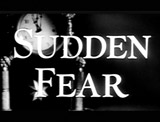
|
Sudden Fear (1952) d. David Miller
RKO's and director David Miller's melodramatic, psychological crime noir included extensive on-location shooting in San Francisco, including Golden Gate Park, although the climactic chase scene was filmed in the Bunker Hill neighborhood of Los Angeles. The suspenseful film was a box-office success, and scored four Academy Award nominations, including a Best Supporting Actor Award for Jack Palance (in his first major role), Best Actress for Joan Crawford (with her third and last nomination, in competition against Bette Davis - and both lost), Best B/W Cinematography, and Best B/W Costume Design (due to 23 costume changes for Crawford). Elmer Bernstein's musical score was also un-nominated. The film's plot involved a love triangle between a married couple: a rich SF heiress and successful, middle-aged, Broadway playwright (Crawford) and ambitious actor (Palance), and a femme fatale (Grahame) from the actor's past - his ex-girlfriend and real lover. Thus commenced a cat-and-mouse thriller between the sexy mistress and scheming husband in an attempt to acquire the money of the wife by eliminating her, not knowing that she had also devised a vengeful scheme to turn the tables on them. The two taglines described the terror and her transformation:
The opening title credits appeared above the image of a small antique clock with a very active swinging pendulum. In NYC's Broadway area, at the Bijou Theater where "Halfway to Heaven" was about to open (scripted by playwright Myra Hudson (Joan Crawford)), rehearsals were being held. In the audience, Myra was displeased with the un-romantic acting style and look of leading man Lester Blaine (Jack Palance) and she fired him for being "not right for the part." He was bitter about her decision and lectured her before leaving the stage:
About a month after the opening of her box-office smash hit, Myra boarded a train for her home in San Francisco, and she happened to notice that Lester was one of the passengers. As their acquaintance blossomed during the long cross-country journey, Lester decided to not disembark in Chicago as planned but to continue on to San Francisco with Myra. He was destined to prove her wrong about how un-romantic he was.
Later after arriving in the city, they went to many posh nightclubs for dinner and late-night dancing. After returning early one morning to her SF mansion with Lester, Myra showed off her work-room with a dictating machine that recorded her spoken thoughts. Lester quoted from her play as he tested it - and they kissed as they listened to the recording:
They were slowly falling in love, but then, on the evening of an exclusive dinner party at Myra's SF mansion, Lester didn't show after two hours and his bags were packed when the frantic Myra arrived at his apartment. He explained he felt out of place in her world and was planning to leave: ("I have no place in your life, Myra. No proper place...I don't belong to your world. You have so much. I have nothing"), but she convinced him to stay - repeating his phrase back to him: "Without you, I have nothing." She hugged and kissed him. They were soon married (off-screen), and early one morning after awakening, Myra told him to look away because she wasn't properly made up:
At an elegant, hosted party by the married couple, one of the invited guests was pretty and young Irene Neves (Gloria Grahame) from New York - the recent girlfriend of Junior Kearney (Mike Connors), the brother of Steve Kearney (Bruce Bennett) - the Kearney brothers together represented Myra as her lawyers. When Irene returned to her Tamalpais Apartments dwelling, she was seized by Lester who was angered by her sudden appearance in town. She claimed she had seen his wedding announcement in the NY newspaper, and had followed him out to San Francisco a week earlier "to see how you were getting along." They had a volatile criminal partnership and background - she had lent him $5,000 dollars in the past and then she referenced "the house on Fire Island...or the night after New Years." He refused to be blackmailed: "If you ever do, you're gonna need a new face." When she reclined back on her sofa and purred: "Thanks a lot...for still loving me," he decided to remain and shut the door - presumably they then had sex (off-screen). Negotiations were ongoing with the Kearney lawyers about Myra's proposed large gift (a percentage of her estate) to charity, in memory of her father, through her Hudson Heart Foundation. Lester insisted to Steve Kearney that he didn't want to live off Myra's wealth: "I'm not the kind of a man who could live on his wife's money." Later, Lester secretly met with Irene, and entered into a partnership with her: "Why don't we really start to work together the way we used to?" - he asked her to entice her boyfriend Junior to find out the amount of Myra's gift - and then he kissed her.
After getting Junior drunk on five martinis, Irene learned that Myra was planning to relinquish her entire inheritance and would retain only her real estate assets and her income royalties earned as a playwright. Not much of her fortune would be left to Lester. She then added, temptingly:
On a Friday evening, Myra met with her lawyer Steve in her work-office with an added change or stipulation to her will. In her revised will, she would bequeath her play income royalties AND her real estate holdings to her "beloved husband" Lester, instead of just $10,000 per year for life following her death:
She insisted on dictating and recording the new terms on her office's voice-activated dictaphone - but then afterwards, she forgot to turn off the device. During a private party and bridge game that evening in Myra's home, Irene and Lester slipped away to speak together in the office (off-screen). The next morning (on Saturday), Myra listened in horror to the recording - she heard Lester and Irene scheming and speaking about her original will. They feared that it would disadvantage Lester, although Myra had actually proposed to give him much more in her revised statement. She heard Lester claim on the recording that he didn't really love her:
She listened as the two embraced and kissed (Irene complained: "You've smeared my lipstick"), and then revealed how misinformed they were about her revised will. Lester was angered when he thought he would receive a pittance of only $10,000 a year until he remarried: "If that dirty double-crossin' dame thinks that she can..." Irene suggested killing Myra before Monday, her birthday - the day she was to finalize her will and sign the trust agreement over to the foundation:
As they ended their recorded conversation, Irene assured Lester: "Three days. We'll work it out. Kiss me. Kiss me. Hard." He responded: "I'm crazy about you. I could break your bones." She didn't like the exaggeration: "No more." Irene asked for her apartment key back to avoid any suspicion: "We'll have to be careful. You'd better give me the key back...You know what key. The key to my apartment." They both agreed Myra's death had to be a "nice, foolproof little accident." Irene reassured Lester: "I know a way" (the recording skipped, repeating the phrase). Completely devastated and stunned by these shocking revelations, Myra went to eject and then hide the recording disk behind a library book, but it dropped from her hands in front of her fireplace and shattered. She fantasized about all the ways she could be killed - falling to her death from a tall building, a fiery car crash off a cliff, or smothering with a pillow. After hearing phrases from the recording playing in her head, Myra devised a similarly diabolical, devious and complex plan to counter-act the plot against her:
Later that night, Myra (dressed up to look like Irene) imagined her detailed time schedule beginning at 11:00 pm, as she sat in preparation in front of her ticking pendulum clock (from the title credits). She saw herself with Irene's gun sneaking into Irene's apartment at 11:20 pm and hiding just before Irene was dropped off by Junior at 11:35 pm. After Junior left, Irene was scheduled to meet Lester in his garage at 11:40 pm, and wait for him there. When Lester arrived at Irene's place at 12:00 midnight, Myra fantasized shooting him to death with Irene's gun, so that the blame could be placed on Irene. Then Myra saw herself returning to her own home at 12:20 am, at the same time that Irene was leaving the garage and entering her apartment at 12:30 am - to find Lester shot dead.
In actuality, the scheduled events went slightly differently than she expected. At about 11:55 pm, Myra was forced to hide in a dark shadowy closet when Junior dropped Irene off and he lingered for a kiss. As midnight approached, Myra (sweating profusely and crying) was repulsed by the thought of murder and changed her mind. She threw down the gun just as Lester showed up, forcing her to again hide in the closet. Lester became suspicious when the phone rang (it was a call from Junior who was concerned about Irene) and then he found Irene's gun on the living room floor and his own planted monogrammed handkerchief in the vacated closet (accidentally dropped by Myra before she fled). Lester raced off to his open convertible at the same time that Myra was running down the street on-foot, and he began chasing after her in a very tense sequence. Simultaneously, Irene left Lester's garage at about 12:35 am, wearing a white scarf, white gloves, a white dress and black coat identical to Myra's outfit.
In the film's final lethal twist, Lester mistook Irene for Myra on the street and ran her down - even though Myra cried out a warning to him: "Lester - that's Irene!" She watched as both were killed in a major smash-up when the car overturned. As a passerby, Myra overheard the two pronounced dead at the wreckage: ("The man's dead. The girl's dead too"). Sorrowful, she heard the ambulance pull up before she walked up the street into the night after discarding her white scarf in the flowing water in the street's rain gutter. |
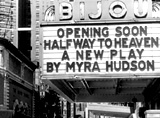 Myra Hudson's Opening Play in NYC 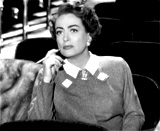 Myra Hudson (Joan Crawford) 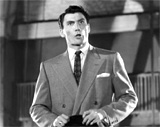 Lester Blaine (Jack Palance) - Angry at Myra For Firing Him From Play 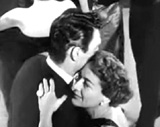 In SF - Dining & Dancing with Myra at Fancy Spots  Myra's Dictating Machine 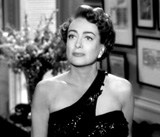 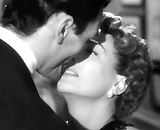 Myra - Falling in Love With Lester While Listening to His Recording 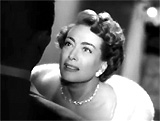 Myra to Lester: "Without you, I have nothing." 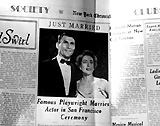 Wedding Announcement in NY Newspaper 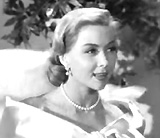 Irene Neves (Gloria Grahame) 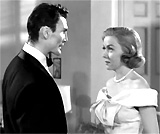 Lester to Irene - Refusing to Be Blackmailed by Her: "If you ever do, you're gonna need a new face" 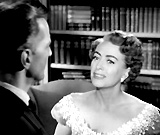 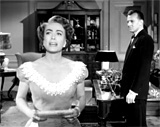 Myra with her Lawyer - Expressing Her Love for Lester By Increasing His Share of Her Inheritance 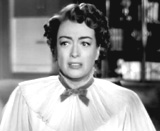 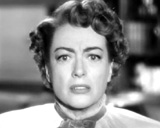 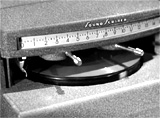 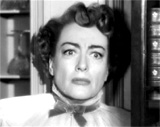 Myra Listening to the Dictaphone Recording - Shocked and in Sudden Fear for Her Life  The Shattered Disk 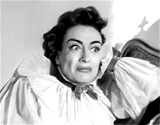 Myra Stunned and Horrified by the Revelations on the Recording 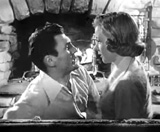 Irene and Lester Plotting Myra's Accidental Murder at the Summer House 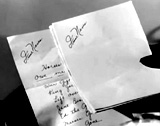 A Sample of Irene's Handwriting and Stationary 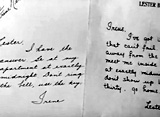 Myra's Two Forged Notes 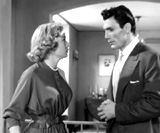 Further Plotting by Irene and Lester to Kill Myra - Considering Poison! 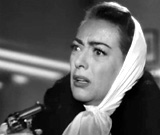 At Midnight, Myra Changed Her Mind About Murdering Lester 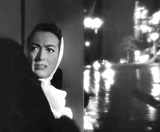 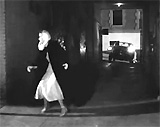 Myra Fled on Foot From Lester in His Car 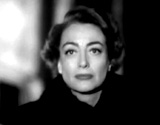 Last Image of Myra - Striding Up the Street Without Her Scarf |
|||||||||||||||||||||